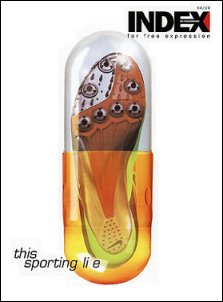 JON
ENTINE
JON
ENTINE
Breaking the taboo
Uncovering the dominance of
black athletes in some sports, and white athletes in others, is a simple
matter of consulting the record books – try to explain it and controversy
is inevitable
Even a casual mention that
significant genetic differences exist between populations can ignite a
firestorm. Roger Bannister, who broke the four-minute barrier in the mile
and is now a distinguished neurologist and retired Oxford don, vas showered
with ridicule in 1995 for venturing his opinion ‘as a scientist rather
than a sociologist’ that all athletes are not created equal.
‘I am prepared to risk
political incorrectness,’ said Sir Roger in a speech before the British
Association for the Advancement of Science, ‘by drawing attention
to the seemingly obvious but under-stressed fact that black sprinters
and black athletes in general all seem to have certain natural anatomical
advantages.’
There are only 800 million
blacks, or one in eight of the world population, but athletes of African
origin hold every major world running record. In the US, blacks make up
70% of the NFL (National Football League) and 85% of professional basketball.
In England, which was slow to allow foreigners into football and has a
black population of less than two per cent, one in five soccer players
in the Premier League is black.
My book, Taboo: Why Black
Athletes Dominate Sports and Why We Are Afraid to Talk About It, relates
the uncontroversial scientific conclusion that environment and culture
alone cannot explain this remarkable phenomenon. ‘If you can believe
that individuals of recent African ancestry are not genetically advantaged
over those of European and Asian ancestry in certain athletic endeavors,’
observes Vincent Sarich, biologist at the University of California, Berkeley,
‘then you could probably be led to believe just about anything. But
such dominance will never convince those whose minds are made up that
genetics plays no role in shaping the racial patterns we see in sports.
When we discuss issues such as race, it pushes buttons and the cortex
just shuts down.’
As equality of opportunity
has increased in sports over the past 30 years, equality of results –
the diversity of the races of the elite players - has declined. And this
is not a black and white issue. \\’hites of Eurasian ancestry, who
have, on average, more natural upper-body strength, predictably dominate
weightlifting and field events such as the shot-put and hammer (whites
hold 46 of the top 50 throws). Where flexibility is key, East Asians shine,
such as in diving and some skating and gymnastic events (hence the term
‘Chinese splits’). Blacks of West African ancestry are the premier
sprinters and jumpers. East African blacks - Kenyans and Ethiopians in
particular- are the world’s best distance runners.
Genetically linked, inherited
characteristics such as skeletal structure, the distribution of muscle-fibre
types, reflex capabilities, metabolic efficiency, lung capacity or the
ability to use energy more efficiently, are not evenly distributed across
racial groups and cannot be explained by known environmental factors.
But don’t expect a dispassionate
public discussion of this issue. Since WWII, anthropological orthodoxy
has held that the very concept of race is a loaded, social construct.
There exists an understandable visceral fear of a slippery slope: if the
conclusion drawn from black domination of Olympic track medals is that
blacks are physically superior, what is to be made of the enorn1ous over-representation
of white Nobel Prize winners?
It was that legitimate concern
that energised Taboo – my intention to do damage to the racist
belief that intelligence and physical ability are somehow inversely connected
like a seesaw. Yet, when I attempted to get the book published, I encountered
a wall of rejections. Broadly, the reaction was: ‘By even suggesting
that blacks may have a genetic edge in sports, you are opening up the
Pandora’s box of intellectual inferiority.’
Intriguingly, many of the
African American intellectuals with whom I shared the evolving manuscript
felt quite the opposite. ‘You will be accused of spouting old-fashioned
racism for even raising the issue of African-American superiority in athletics,’
wrote Earl Smith, Chairman of the Department of Sociology at Wake Forest
University, a leading black scholar and one of my board members. ‘All
this beating around the bush has to stop. This is a good book. I am quite
excited with the arguments that are raised.’
Although the book has taken
some hits from blacks – Jeffrey Sammons, a history professor at New
York University, called it ‘racist’ though he admitted he hadn’t
read it – the reaction has been generally positive and overwhelmingly
constructive, which was the motive for the book. The most hostile reaction
has been from liberal whites. Anthropologist Jonathan Marks, in an opinion
piece for the New York Times, called Taboo ‘demagogic
quackery’ and a ‘piece of good old fashioned American anti-intellectualism’.
Marks did not mention that he was criticised in the book for his neo-Creationist
views and well-known extremist political biases.
What are we to make of a phenomenon
in which Establishment whites and blacks, so quick to crow about their
own racial sensitivity, recklessly inject racial divisiveness into a debate
in which scientists and most African-Americans see reason? The black;
community in particular has become irritated to the point of anger about
the patronising censorship and codes of silence that many institutions
employ to ‘protect them’. ‘I am an editorial columnist,’
wrote Bill Maxwell of the St. Petersburg Times in a note to me
after his glowing column on Taboo ‘I reviewed your book because I
enjoyed reading, it. It cut through all of the bullshit. I am black.’
Humans are truly diverse,
biologically and culturally. Acknowledging our differences may approach
a danger zone, but pretending that there are no slippery questions does
not prevent them from being asked, if only under one’s breath. And
that’s far more dangerous.
Jon Entine is a writer and Emmy-winning producer who has worked for NBC and ABC News. Taboo is published by PublicAffairs, US. More at www.jonentine.com